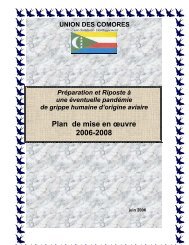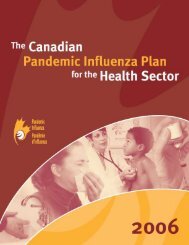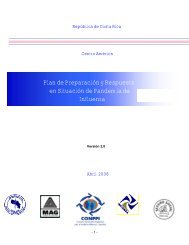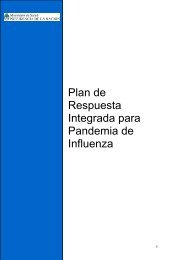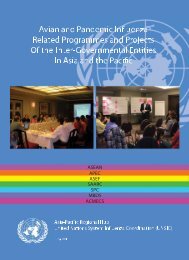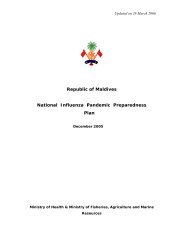GES Simulation Guide v3.pdf - Avian Influenza and the Pandemic ...
GES Simulation Guide v3.pdf - Avian Influenza and the Pandemic ...
GES Simulation Guide v3.pdf - Avian Influenza and the Pandemic ...
You also want an ePaper? Increase the reach of your titles
YUMPU automatically turns print PDFs into web optimized ePapers that Google loves.
EXERCISE OVERVIEW | Pg 29 EXERCISE OVERVIEW | Pg 30<br />
END THE <strong>GES</strong> EXERCISE<br />
Assuming a 09:00 start, <strong>the</strong> <strong>GES</strong> exercise generally runs until 17:00. Ending <strong>the</strong><br />
exercise involves <strong>the</strong> following steps:<br />
REVIEW<br />
QUALITY OF<br />
• At around 15:30, an e-mail is sent alerting <strong>the</strong> participants that <strong>the</strong> end of<br />
<strong>the</strong> exercise is approaching <strong>and</strong> that <strong>the</strong>y should begin to submit any documents<br />
to <strong>the</strong> SAC which are still outst<strong>and</strong>ing. You should stop sending new<br />
task or informational e-mails now to give <strong>the</strong>m a chance to finish up existing<br />
assignments.<br />
• At 16:30, <strong>the</strong> second <strong>and</strong> last e-mail alert is sent, instructing <strong>the</strong>m that <strong>the</strong><br />
exercise will end at 17:00 <strong>and</strong> all documents must be submitted by that time<br />
if <strong>the</strong> documents are to be considered part of <strong>the</strong> participants’ expected<br />
outputs.<br />
• At 17:00, send <strong>the</strong> “End of <strong>Simulation</strong>” e-mail.<br />
Be sure to send <strong>the</strong> final e-mail to all participants who are expected to attend<br />
<strong>the</strong> debriefing workshop on <strong>the</strong> next day 4 .<br />
EXPECTED OUTPUTS<br />
After 17:00, make sure all documents submitted by <strong>the</strong> participants to fulfil <strong>the</strong><br />
exercise’s “expected outputs” are printed. The skills leading up to <strong>the</strong> creation<br />
of <strong>the</strong>se documents—observed unobtrusively by members of <strong>the</strong> facilitation<br />
team--should also be clearly documented by <strong>the</strong> observer group <strong>and</strong> shared<br />
at <strong>the</strong> debriefing session. Your facilitation team should note which expected<br />
outputs have actually been produced <strong>and</strong> submitted by <strong>the</strong> deadline, <strong>and</strong> review<br />
<strong>the</strong>se for quality. Reviewing <strong>the</strong> quality of tasks in <strong>the</strong> evening before <strong>the</strong> debriefing<br />
can be challenging.<br />
REVIEW<br />
In assessing participant performance, your team should review <strong>the</strong> Participant<br />
Response Log (Annex A.04.03.), your notes from <strong>the</strong> simulation, <strong>and</strong> <strong>the</strong> actual<br />
output documents prepared by <strong>the</strong> participants, <strong>and</strong> <strong>the</strong>n list <strong>the</strong> specific events<br />
or situations you observed that should be included as debriefing points in <strong>the</strong><br />
next day’s workshop. If one of your team members is skilled in a particular area,<br />
such as emergency planning, finance, or health, s/he should critically assess that<br />
component of <strong>the</strong> response plans prepared by <strong>the</strong> participants <strong>and</strong> be prepared to<br />
give feedback when <strong>and</strong> if appropriate. One option to assist what can be a technical<br />
review is to have technical experts create specific reference sheets (Annex<br />
A.04.07.) ahead of time to assist facilitators in this quality analysis.<br />
Refer to Annex A.04.07. on Page 71 for <strong>the</strong> sector-specific Technical<br />
Reference Sheets.<br />
Refer to Annex B.05. on Page 87 for guidance on reviewing <strong>the</strong> quality of<br />
Expected Outputs.<br />
FACILITATOR OBSERVATIONS<br />
FROM MEETINGS ATTENDED<br />
Take some time after <strong>the</strong> exercise to review each team member’s key findings/observations<br />
from <strong>the</strong> various coordination meetings attended during <strong>the</strong> exercise.<br />
Of key importance are, among o<strong>the</strong>r concerns:<br />
• Demonstrations of leadership by particular participants or authorities.<br />
• Indications of a clear underst<strong>and</strong>ing (or not) of emergency management procedures.<br />
• Whe<strong>the</strong>r or not participants activated <strong>and</strong> made reference to existing contingency<br />
plans.<br />
• Effective meeting coordination & management.<br />
• Knowledge of appropriate technical responses to <strong>the</strong> crisis.<br />
4 Normally <strong>the</strong> debriefing includes those in a position to make decisions with regard to emergency preparedness <strong>and</strong> response plans <strong>and</strong> procedures. This list<br />
generally includes ministry or authority heads, <strong>the</strong>ir deputies <strong>and</strong> key senior programme or emergency officers. The exact list will depend upon a number of<br />
factors: <strong>the</strong> Minister’s (or minister’s representative’s) plans, <strong>the</strong> debriefing venue <strong>and</strong> its capacity, your team’s ability to facilitate larger groups, etc. Generally,<br />
you should plan on anywhere between 25 <strong>and</strong> 40 participants.<br />
Refer to Annex B.04. on Page 84 for additional guidance on reviewing <strong>the</strong><br />
quality meetings attended.


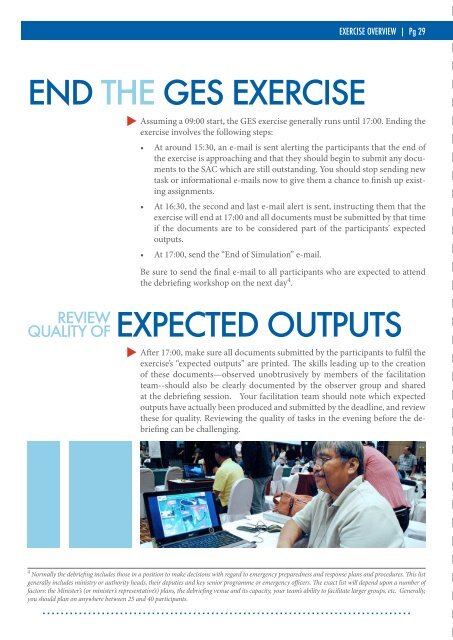
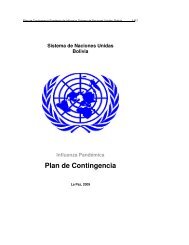
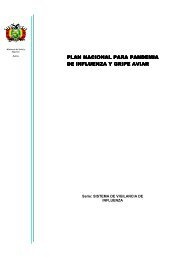
![Tanzania National Plan (January 2007)[1].pdf - Avian Influenza and ...](https://img.yumpu.com/36423433/1/190x245/tanzania-national-plan-january-20071pdf-avian-influenza-and-.jpg?quality=85)
